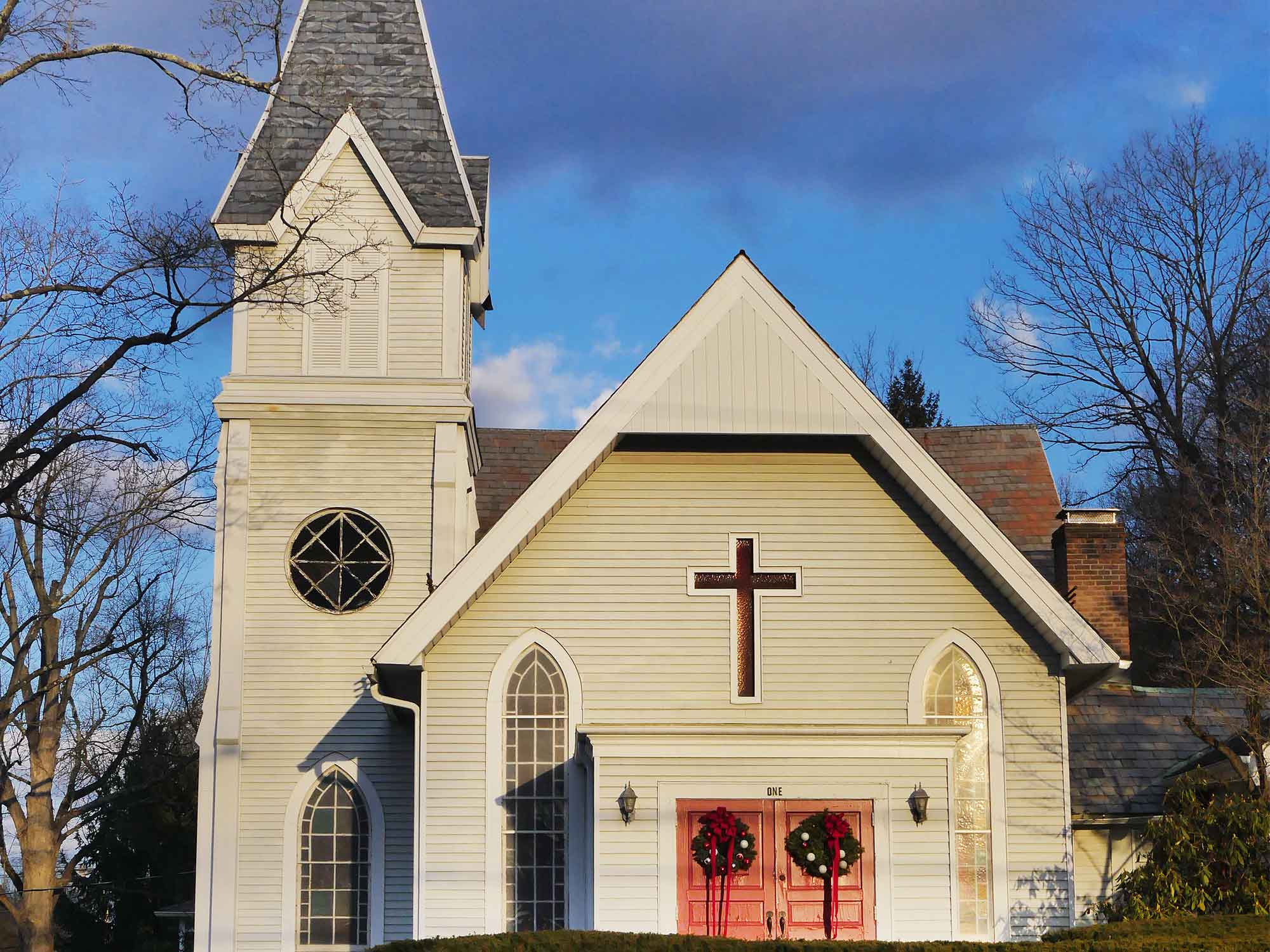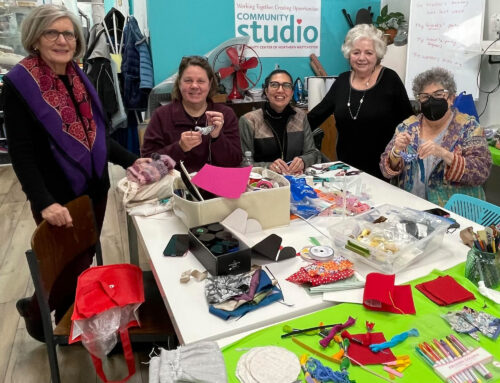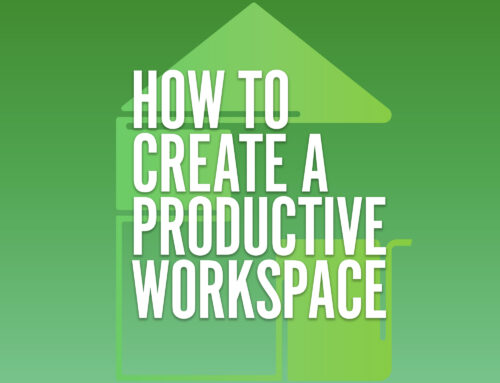In approximately 1887, Bedford’s African American community, who routinely congregated for services in their homes, registered as a religious corporation in the State of New York. Led by Reverend F. C. McGee, neighbors worked together over the next several years to build a place of worship. By 1894, the Antioch Missionary Baptist Church completed construction in Bedford Centre. Now, Antioch is one of the community’s longest-standing churches, coming up on its 139th year, which speaks to the strength of the congregation and undying love from the community.
The early years
“The church was always open to everyone,” says Shirley Mosley, chair of Antioch’s History and Archives Ministry. “Originally, people of color relocated here from the south during the Great Migration and, as it grew, they were always welcoming of others, no matter what race they were or what background they had.”
In 1918, with financial help from local residents, the church moved a short distance. But after only 10 years, the church relocated again due to construction plans for the Saw Mill River Parkway. With a $10,000 compensation from the Westchester County Parkway Commission, the church moved to the corner of Railroad Avenue.
Throughout the 1930s and early 1940s, the church underwent several leadership changes whose ministries mainly focused on progressing and uplifting the growing congregation, which had just under 50 members.
“The church continually did things within the community to make life better for those that were less fortunate or needed help, and to expand the congregation,” says David Brown, vice chairman of the Bedford Hills Historical Society.
“For example, at the time of war, the homefront club rolled bandages to send off to military bases.”
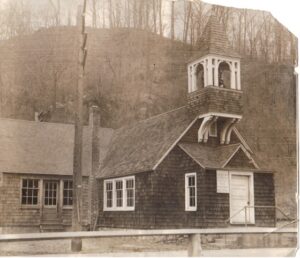
Antioch Baptist Church, circa 1920s
Reverend Strother and a new wave
In 1965, Reverend Rufus A. Strother became the pastor.
“Strother is the most well-known pastor because he was such a phenomenal man,” says Mosley. “He welcomed everyone and made it very clear the church’s doors were open to anyone. He preached the message of an inclusive fellowship and was very socially minded.”
Strother’s tenure was instrumental in strengthening and growing the church, along with supporting and improving the local community. He served as a member of many corporate boards, and under his ministry, the church became affiliated with the Central Hudson Baptist Association, purchased and developed a youth center, extended affordable housing to the community, launched children and youth summer programs, and more.
In 1968, following Dr. Martin Luther King Jr.’s assassination, Strother led his congregants in developing a myriad of annual events to honor Dr. King’s legacy, including an interfaith banquet, a seminar and a worship service — most of which continue today.
“These keep the dream alive and serve to educate the younger people about Dr. King,” says Brown who was Strother’s assistant. “Strother was an expert leader who did great things. Not only was he an inspiration for the church, but also for the town.”
As part of Strother’s social justice work, Antioch was one of the founding churches of the Northeast Westchester Council on Equality (NEWCOE), which was created following Dr. King’s assassination and spearheaded by Strother.
“NEWCOE was composed of seven towns that came together to look for housing, jobs and opportunities to move the congregation along and encourage love in the community between all people of all faiths,” explains Brown, who served as president of NEWCOE for several years. “It was a voice for people without a voice. We held seminars for people seeking advice, and we came together to just make life better for everyone in upper Westchester.”
Twelve years ago, NEWCOE was disbanded after the board mutually agreed that it was no longer needed.
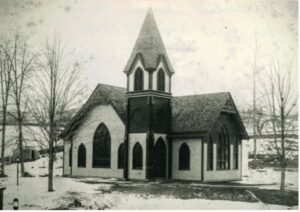
Antioch Baptist Church, 1886
The Growing Church
With an expanding congregation, the church sought a larger space in the mid 1970s. Hoping to purchase the United Methodist Church, Strother and three Antioch members, including Brown, negotiated the purchase with the Methodist church’s Reverend Will Porter.
“We had several successful meetings; it was a significant change and a very nice transition for the community, who were very supportive of us,” Brown explains. “The move helped expand and integrate the predominantly black congregation to bring in many others.”
On April 16, 1976, Palm Sunday, the congregation met at the Railroad Avenue building and walked together to Church and Main Street for their first service in their new building. Once moved in, Antioch made a number of additions, including installing the memorial window from their previous building.
Throughout the 1980s, the church grew rapidly and Strother introduced a social issues committee that arranged for local politicians to meet and discuss issues with congregants and the community.
“Before an election, we invite the community to hear from the candidates of all parties,” explains Brown. “The candidates get to know the people in our community and the people get to ask questions, hear the candidates and see what platform they’re representing. I think it’s very beneficial to get to know who is running for office.”
To accommodate the growing church, a new wing was added in 1985.
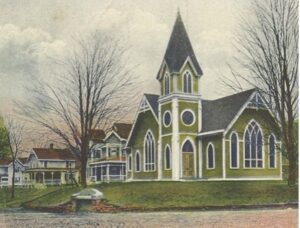
Antioch Baptist Church, 1905
The early 2000s
On January 4, 2004, Pastor Strother addressed hundreds in his final sermon, completing 38 years as Antioch’s longest-serving pastor.
The new pastor, Reverend Dr. Paul S. Briggs, ushered in more upgrades for their building and dedicated significant attention and resources to the children and youth ministries. Under his tenure, youth in the community received support and mentorship through numerous programs such as camping and rafting trips, senior citizen brunches and mission trips to rebuild homes in West Virginia, Florida and New York.
After 10 years, Briggs passed the helm to the church’s current pastor, Reverend Merle D. McJunkin.
McJunkin didn’t take long to leave his mark. In 2015, Antioch Trustees, Westchester County, the town of Bedford and New York State partnered together to transform Antioch’s Railroad Avenue properties into government-supported affordable housing. After much discussion, Westchester County purchased the land, deeding it to Antioch Development Corporation to manage the project’s renovation. Antioch Homes was completed in 2017 and features eight single-bedroom and four two-bedroom apartments.
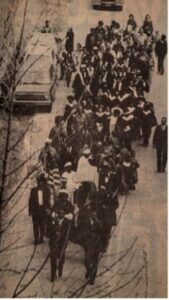
The April 16, 1976 walk to their new building on Church and Main Street.
A church for the community
With McJunkin at the helm, the church is a vibrant part of the Bedford community, providing a plethora of new and continuing diverse services and programs.
Recognizing a need, McJunkin developed Harvest Community in 2015. The church-wide program distributed excess fresh produce from local growers, farmers markets and grocery stores, helping combat food insecurity in our area – it ran until the pandemic began.
Under McJunkin’s leadership, the church became a founding member of A-HOME, which provides affordable housing to residents in Northern Westchester, and The Community Center of Northern Westchester. Antioch also feeds and houses homeless people for a week every year as part of its commitment to the Emergency Shelter Partnership.
Over the years, various youth programs have included SAT/ACT preparation courses, summer enrichment programs, and a joint civil rights trip to Selma, Birmingham, Montgomery and Atlanta with Temple Beth El. Antioch also provides scholarships and guides high school graduates towards opportunities for grants, internships and employment.
“Throughout the community, our church and its members help influence social policies and support numerous efforts to improve our local schools, community programs and more,” says McJunkin. “And, some of our members have been among our region’s most impactful leaders.”
The church also provides national and international aid. During the past several years, they’ve raised funds for hurricane relief in Houston and Puerto Rico, made quilts for nursing homes and t-shirt dresses for young girls in Haiti.
“Antioch is an extraordinary church with a loyalty that I’ve never seen in any other church organization,” says Mosley. “The people love the church and are like a close-knit family. If you join that family, you’re part of that family.”
Today, Antioch’s members include residents throughout Westchester, as well as some who live in New York City and Connecticut.
“Our church has a direct connection to the people who were enslaved at John Jay Homestead,” says Pastor McJunkin. “And although we tend to attract folks who are African American, we are also blessed to have many congregants who are not African American. We’ve had a diverse group of members through at least the last three pastors. Antioch is affirming and welcoming of everyone.”
This article was published in the January/February 2023 print edition of Katonah Connect.



